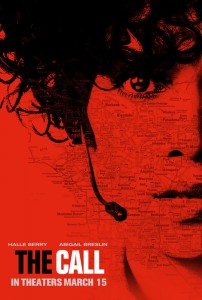
Director: Brad Anderson
MPAA Rating: R
Film Pulse Score: 5/10
Cell phones that serve as main plot devices have not yet proven to be good carriers for films in the thriller/suspense genre (Cellular, 88 Minutes), and The Call is hardly an upgrade. Director Brad Anderson (The Machinist, Transsiberian) does what he can to scrape as much tension as possible out of an hour and a half long phone conversation between a woman at a desk and a girl locked in a trunk, and while he does manage to keep audiences on the line for the first half of the film, the connection is lost in the third act. Top it all off with an ending that feels about as conclusive as a dropped call, and you’ve got a story that’s best left unanswered.
The film opens with Jordan (Halle Berry), a 911 operator who had to give up her days as an operator on the floor after failing to save a young girl who had been kidnapped. One day, during a training session, a call comes in from a similar young girl, and Jordan reassumes her position when she realizes that the girl on the phone has been kidnapped by the same man who killed the girl she couldn’t save. She spends the rest of the film talking into a headset, staring at the girl’s untraceable cell phone on the computer monitor, and making a series of progressively shocked faces, until she finally decides to take matters into her own hands.
It’s difficult to turn a premise that sounds like a pitch for a thirty minute episode of Law and Order into an hour and a half film, but Anderson manages to keep the audience consistently engaged with enough well-placed “watch out behind you!’ and “don’t go in there!” moments to break up the back-and-forth phone banter. Anderson’s expertly crafted claustrophobic close-ups are interspersed throughout, making us want to get out of the trunk scene just as bad as the little girl locked inside. We feel for the helpless Jordan as she struggles to do her best with a poor connection. We even feel for the actress Berry herself, as she too is doing the best she can with a bulging poodle-cut up-do and a script that attempts to get a heartfelt moment out of a Bridesmaids reference and whose only non-cliché moment of writing can be attributed to a particular frozen scalp sniffing scene.
Despite formulaic writing, there’s enough tension to keep The Call connected –that is, until a jarring tonal shift in the final act, when our hero finally decides to leave the office and take matters into her own hands. As she uncovers clues about the kidnapper’s back story, she unintentionally reveals that the writers actually gave the sociopathic antagonist more emotional complexity and character development than the majority of protagonists in the film. To top it off, the film ends abruptly with an out-of-character one-liner from Berry that feels more like a ploy to cut down runtime than an actual ending.
In the end, it’s safe to say that Hollywood has once again managed to get something into theaters that should’ve gone straight to DVD. Anderson and Berry do what they can to keep the story going, but in the end, poor writing and an inconclusive ending make this call not worth answering.






